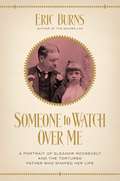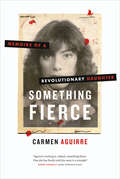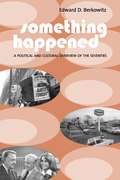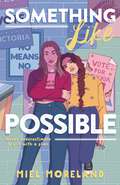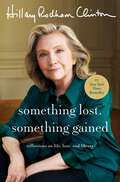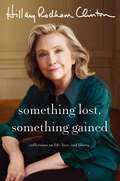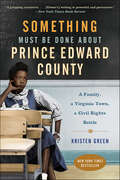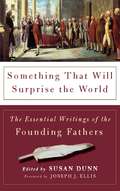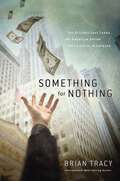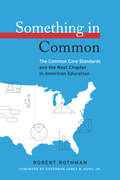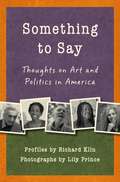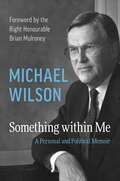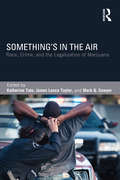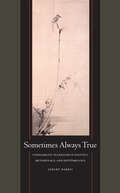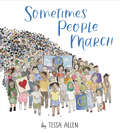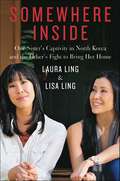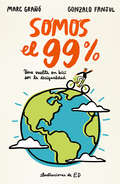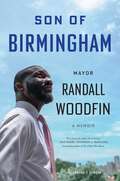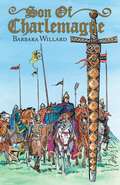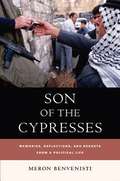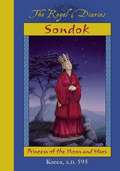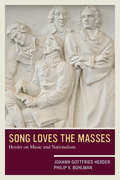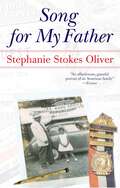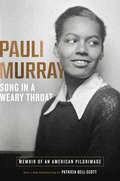- Table View
- List View
Someone to Watch Over Me: A Portrait of Eleanor Roosevelt and the Tortured Father Who Shaped Her Life
by Eric BurnsA fresh and sensitive examination of Eleanor Roosevelt—one of the most remarkable Americans in history—and the tortured father who would inspire and shape her future leadership and advocacy. Eleanor Roosevelt is viewed as one of the most pioneering women in American history. But she was also one of the most enigmatic and lonely. Her loveless marriage with FDR was no secret, and she had a cold relationship with most of her family, as well, from her distant mother to her public rivalry with her cousin, Alice. Yet she was a warm person, beloved by friends, and her humanitarian work still influences the world today. But who shaped Eleanor? It was the most unlikely of figures: her father Elliott, a lost spirit with a bittersweet story. Elliott was the brother of Theodore Roosevelt, and he was as winsome and charming as Theodore was blustery and competitive. Though the two maintained a healthy rivalry in their youth, Elliott would eventually succumb to alcoholism and would be exiled to the Virginia countryside. But he kept up a close correspondence with his daughter, Eleanor, who treasured his letters and would read them nightly for her entire life for guidance, inspiration, and love. As he did in the critically acclaimed The Golden Lad, Eric Burns' insightful and lucid prose reveals new facets to the lives of these pillars of American history.
Something Fierce
by Carmen AguirreWinner of Canada Reads 2012 Nominated for the Charles Taylor prize and the BC Award for Canadian Non-FictionOn September 11, 1973, General Augusto Pinochet led a violent coup that removed Salvador Allende, the democratically elected socialist president of Chile, from office. Thousands were arrested, tortured and killed under the repressive new regime. Six-year-old Carmen Aguirre and her younger sister fled the country with their parents for a life in exile.Five years later, when her mother and stepfather returned to South America as Chilean resistance members, Carmen and her sister's double lives began. At 18, Carmen herself joined the resistance, plunging further into a world of terror, paranoia, and euphoria. Something Fierce takes the reader inside war-ridden Peru, dictatorship-run Bolivia, post-Malvinas Argentina, and Pinochet's Chile during the eventful decade between 1979 and 1989.Dramatic, suspenseful, and darkly comic, it is a rare account of revolutionary life and a passionate argument against forgetting.
Something Happened: A Political and Cultural Overview of the Seventies
by Edward BerkowitzIn both the literal and metaphorical senses, it seemed as if 1970s America was running out of gas. The decade not only witnessed long lines at gas stations but a citizenry that had grown weary and disillusioned. High unemployment, runaway inflation, and the energy crisis, caused in part by U.S. dependence on Arab oil, characterized an increasingly bleak economic situation. As Edward D. Berkowitz demonstrates, the end of the postwar economic boom, Watergate, and defeat in Vietnam led to an unraveling of the national consensus. During the decade, ideas about the United States, how it should be governed, and how its economy should be managed changed dramatically. Berkowitz argues that the postwar faith in sweeping social programs and a global U.S. mission was replaced by a more skeptical attitude about government's ability to positively affect society.From Woody Allen to Watergate, from the decline of the steel industry to the rise of Bill Gates, and from Saturday Night Fever to the Sunday morning fervor of evangelical preachers, Berkowitz captures the history, tone, and spirit of the seventies. He explores the decade's major political events and movements, including the rise and fall of détente, congressional reform, changes in healthcare policies, and the hostage crisis in Iran. The seventies also gave birth to several social movements and the "rights revolution," in which women, gays and lesbians, and people with disabilities all successfully fought for greater legal and social recognition. At the same time, reaction to these social movements as well as the issue of abortion introduced a new facet into American political life-the rise of powerful, politically conservative religious organizations and activists.Berkowitz also considers important shifts in American popular culture, recounting the creative renaissance in American film as well as the birth of the Hollywood blockbuster. He discusses how television programs such as All in the Family and Charlie's Angels offered Americans both a reflection of and an escape from the problems gripping the country.
Something Like Possible
by Miel MorelandIn this compelling YA contemporary from author Miel Moreland, a bisexual teen's path to political staffer stardom is in jeopardy, until she convinces a cute new candidate to team up with her on the campaign trail.On the worst day of her life, Madison is dumped by her girlfriend, then fired as said (ex)girlfriend’s campaign manager... plus she accidentally rear-ends the student government advisor—the one person whose good word might help her win a spot at a prestigious youth politics summer camp.But Madison is nothing if not a girl with a plan, and she isn’t going to let a little thing like heartbreak (or a slightly dented bumper) get in her way. Soon, she has a new junior class president candidate to back—although the two of them might be getting a little too close on the campaign trail. Between navigating her growing crush and corralling a less than enthusiastic election team, Madison has had it with unexpected changes to her carefully laid plans. But when she and a group of queer classmates discover a pattern of harassment within the student government, Madison's forced to shift gears once again.Something Like Possible is a love letter to ambitious girls, queer solidarity, and how to keep moving forward when the world seems set on pushing you back."For every ambitious girl who has been told that they are “too much,” Something Like Possible is a validating promise that you are enough.” —Marisa Kanter, author of As If On Cue
Something Lost, Something Gained: Reflections on Life, Love, and Liberty
by Hillary Rodham ClintonWhat would it be like to sit down for an impassioned, entertaining conversation with Hillary Clinton? In Something Lost, Something Gained, Hillary offers her candid views on life and love, politics, liberty, democracy, the threats we face, and the future within our reach.She describes the strength she draws from her deepest friendships, her Methodist faith, and the nearly fifty years she&’s been married to President Bill Clinton—all with the wisdom that comes from looking back on a full life with fresh eyes. She takes us along as she returns to the classroom as a college professor, enjoys the bonds inside the exclusive club of former First Ladies, moves past her dream of being president, and dives into new activism for women and democracy. From canoeing with an ex-Nazi trying to deprogram white supremacists to sweltering with salt farmers in the desert trying to adapt to the climate crisis in India, Hillary brings us to the front lines of our biggest challenges. For the first time, Hillary shares the story of her operation to evacuate Afghan women to safety in the harrowing final days of America&’s longest war. But we also meet the brave women dissidents defying dictators around the world, gain new personal insights about her old adversary Vladimir Putin, and learn the best ways that worried parents can protect kids from toxic technology. We also hear her fervent and persuasive warning to all American voters. In the end, Something Lost, Something Gained is a testament to the idea that the personal is political, and the political is personal, providing a blueprint for what each of us can do to make our lives better. Hillary has &“looked at life from both sides now.&” In these pages, she shares the latest chapter of her inspiring life and shows us how to age with grace and keep moving forward, with grit, joy, purpose, and a sense of humor.
Something Lost, Something Gained: Reflections on life, love, and liberty
by Hillary Rodham ClintonWhat would it be like to sit down for an impassioned, entertaining conversation with Hillary Clinton? In Something Lost, Something Gained, Hillary offers her candid views on life and love, politics, liberty, democracy, the threats we face, and the future within our reach. She describes the strength she draws from her deepest friendships, her Methodist faith, and the nearly fifty years she&’s been married to President Bill Clinton—all with the wisdom that comes from looking back on a full life with fresh eyes. She takes us along as she returns to the classroom as a college professor, enjoys the bonds inside the exclusive club of former First Ladies, moves past her dream of being president, and dives into new activism for women and democracy. From canoeing with an ex-Nazi trying to deprogram white supremacists to sweltering with salt farmers in the desert trying to adapt to the climate crisis in India, Hillary brings us to the front lines of our biggest challenges. For the first time, Hillary shares the story of her operation to evacuate Afghan women to safety in the harrowing final days of America&’s longest war. But we also meet the brave women dissidents defying dictators around the world, gain new personal insights about her old adversary Vladimir Putin, and learn the best ways that worried parents can protect kids from toxic technology. We also hear her fervent and persuasive warning to all American voters. In the end, Something Lost, Something Gained is a testament to the idea that the personal is political, and the political is personal, providing a blueprint for what each of us can do to make our lives better. Hillary has &“looked at life from both sides now.&” In these pages, she shares the latest chapter of her inspiring life and shows us how to age with grace and keep moving forward, with grit, joy, purpose, and a sense of humor.
Something Must Be Done About Prince Edward County: A Family, a Virginia Town, a Civil Rights Battle
by Kristen GreenThe provocative true story of one Virginia school system’s refusal to integrate after the US Supreme Court declared school segregation unconstitutional.A New York Times BestsellerA Washington Post Notable Book of the YearIn the wake of the Supreme Court’s unanimous Brown v. Board of Education decision, Virginia’s Prince Edward County refused to obey the law. Rather than desegregate, the county closed its public schools, locking and chaining the doors. The community’s white leaders quickly established a private academy, commandeering supplies from the shuttered public schools to use in their all-white classrooms. Meanwhile, black parents had few options: keep their kids at home, move across county lines, or send them to live with relatives in other states. For five years, the schools remained closed.Kristen Green, a longtime newspaper reporter, grew up in Farmville and attended Prince Edward Academy, which did not admit black students until 1986. In her journey to uncover what happened in her hometown before she was born, Green tells the stories of families divided by the school closures and of 1,700 black children denied an education. As she peels back the layers of this haunting period in our nation’s past, her own family’s role—no less complex and painful—comes to light.Praise for Something Must Be Done About Prince Edward County“[Green’s] thoughtful book is a gift to a new generation of readers who need to know this story.” —Washington Post“A gripping narrative. . . . [Green’s] writing is powerful and persuasive.” —New York Times Book Review“Intimate and candid.” —Richmond Times-Dispatch“Not easily forgotten.” —Minneapolis Star Tribune
Something That Will Surprise the World
by Susan DunnThe Founding Fathers: subject of hundreds of biographies, they are rarely allowed to speak to us in their own words. But it was their words and ideas that mattered most to them. Here, finally, these towering figures come together in one volume-in dialogue with one another, and with us. The Founders were thinking revolutionaries-they read, questioned, debated, and, most of all, wrote. They theorized about government and political institutions; considered the problem of parties and factions; and reflected on religion, education, happiness, and even on love. In this volume, distinguished historian Susan Dunn brings together the Founders’ most important letters, speeches, and essays and sets them in the context of their lives and times.
Something for Nothing: The All-Consuming Desire that Turns the American Dream into a Social Nightmare
by Brian TracyAmerica's greatness comes from people working hard to fulfill their dreams. But today that greatness is being undermined by people using the government to steal other people's dreams (and money). Rather than participate and innovate in the marketplace, generating goods and services that benefit society, people are increasingly vying for political advantage to live at the expense of others. Something for Nothing reveals the social and personal threats inherent in this emerging "grabbing match" culture, juxtaposing free-market virtues against government vices, explaining how the something-for-nothing mentality corrupts the political system, undermines corporate success, and stifles the individual's ability to prosper and contribute long-term to society. More than exposing the dangers, however, Tracy helps readers set a personal and culture-wide agenda for change.
Something in Common: The Common Core Standards and the Next Chapter in American Education
by James B Hunt Jr. Robert RothmanSomething in Common is the first book to provide a detailed look at the groundbreaking Common Core State Standards and their potential to transform American education. This book tells the story of the unfolding political drama around the making of the Common Core State Standards for math and English language arts, which were adopted by 43 states and the District of Columbia over a six-month period in 2010, after decades of similar proposals had gone down in flames. As a senior fellow at the major organization promoting the Common Core standards, education writer Bob Rothman gives the reader a bird's eye view of this unfolding drama and brings the major players to life with lively anecdotes and behind-the-scenes details. He describes the developments leading up to the historic agreement and compares them to earlier efforts. He also explains the content of the standards in depth, describes steps being taken to implement them, and examines how the assessment consortia plan to measure student performance against the new standards. The book is a must-have reference work for researchers, practitioners, school leaders, policy makers, and others interested in contemporary education policy and reform.
Something in Common: The Common Core Standards and the Next Chapter in American Education (HEL Impact Series)
by Robert RothmanSomething in Common is the first book to provide a detailed look at the groundbreaking Common Core State Standards and their potential to transform American education. This book tells the story of the unfolding political drama around the making of the Common Core State Standards for math and English language arts, which were adopted by 43 states and the District of Columbia over a six-month period in 2010, after decades of similar proposals had gone down in flames. As a senior fellow at the major organization promoting the Common Core standards, education writer Bob Rothman gives the reader a bird&’s eye view of this unfolding drama and brings the major players to life with lively anecdotes and behind-the-scenes details. He describes the developments leading up to the historic agreement and compares them to earlier efforts. He also explains the content of the standards in depth, describes steps being taken to implement them, and examines how the assessment consortia plan to measure student performance against the new standards. The book is a must-have reference work for researchers, practitioners, school leaders, policy makers, and others interested in contemporary education policy and reform.
Something to Say
by Lily Prince Richard Klin"Klin is an insightful interviewer and a marvelous writer. We were delighted to have the opportunity to publish the interview with Howard Zinn from Something to Say."-The Bloomsbury ReviewThe fusion of art and politics is axiomatic in much of the world. In America, their relationship is erratic. What is art in the service of social justice? Is an artist obligated to address the political? This book profiles, in words and photos, disparate creative forces who offer thoughts on their point of engagement with the political sphere. In the words of Pete Seeger, art "may save the world. Visual arts, dancing, acting arts, cooking arts. . . . Joe DiMaggio reaching for a fly ball-that was great dancing!"Profiles in Something to Say:The late Howard ZinnPete SeegerYoko OnoScreenwriter Ron NyswanerPalestinian American standup comedian Maysoon ZayidPoet Quincy TroupeDominican American painter Freddy RodríguezFilmmaker Gini RetickerSlowpoke cartoonist Jen SorensenPerformance and installation artist Sheryl OringChildren's writer Jacqueline WoodsonChef and food activist Didi EmmonsChinese American poet and art critic John YauPunk-rock activist Franklin Stein of the band BlowbackKlezmer fiddler Alicia SvigalsRichard Klin's writing has appeared in the Brooklyn Rail, Forward, The Bloomsbury Review, Parabola, The Rambler, and other media.Lily Prince has exhibited in over fifty national and international exhibitions and has been awarded commissions by numerous hotels and the NYC Department of Cultural Affairs. She is an associate professor of art at William Paterson University. Her work has appeared in The New York Times, New York Magazine, Newark Star-Ledger, New American Paintings, San Francisco Weekly, and other media.
Something within Me: A Personal and Political Memoir
by Michael WilsonThe late Honourable Michael Wilson was a Canadian politician and business professional. As Minister of Finance under Brian Mulroney, Wilson was one of the key negotiators of the Canada-United States Free Trade Agreement – one of Canada’s most important economic agreements in the last 50 years, later superseded by NAFTA. In addition, Wilson was responsible for implementing the controversial Goods and Services Tax (GST), which remains key to the federal government today. After his life in Parliament, Wilson served as Ambassador to the United States and Chancellor of the University of Toronto. Outside of politics, Wilson was active in raising awareness of mental health issues following the traumatic loss of his son, Cameron, to suicide. Devoting considerable time to advocacy, he established the Cameron Parker Holcombe Wilson Chair in Depression Studies at the University of Toronto and served as Board Chair for the Mental Health Commission of Canada. Something within Me highlights how Wilson’s personal life blended with his political life and accomplishments, detailing his advocacy for mental health awareness as well his involvement in important pieces of legislation that made significant impacts in Canadian political and economic history. These deeply personal stories, particularly those of a father grappling with his son’s illness and death, remind us of the lives behind the political personas that shape our world.
Something's in the Air: Race, Crime, and the Legalization of Marijuana
by Katherine Tate James Lance Taylor Mark Q. SawyerAmerica’s drug laws have always exerted an unequal and unfair toll on Blacks and Latinos, who are arrested more often than Whites for the possession of illegal drugs and given harsher sentences. In this volume, contributors ask how would marijuana legalization affect communities of color? Is legalization of marijuana necessary to safeguard minority families from a lifetime of hardship and inequality? Who in minority communities favors legalization and why, and do these minority opinions differ from the opinions held by White Americans? This volume also includes analyses of the policy debate by a range of scholars addressing economic, health, and empowerment issues. Comparative lessons from other countries are also analyzed.
Sometimes Always True: Undogmatic Pluralism in Politics, Metaphysics, and Epistemology
by Jeremy BarrisSometimes Always True aims to resolve three connected problems. First, we need an undogmatic pluralist standpoint in political theory, metaphysics, and epistemology. But genuine pluralism suffers from the contradiction that making room for fundamental differences in outlook means making room for outlooks that exclude pluralism.Second, philosophy involves reflecting on the world and meaning as a whole, yet this means adopting a vantage point in some way outside of meaning.Third, our lived experience of the sense of our lives similarly undermines its own sense, as it involves having a vantage point in some way wholly outside ourselves.In detailed engagement with, among others, Davidson, Rorty, Heidegger, Foucault, Wilde, and gender and sexuality theory, the book argues that these contradictions are so thoroughgoing that, like the liar’s paradox, they cancel the bases of their own meaning. Consequently, it argues, they resolve themselves and do so in a way that produces a vantage point on these issues that is not dogmatically circular because it is, workably, both within and outside these issues’ sense. The solution to a genuinely undogmatic pluralism, then, is to enter into these contradictions and the process of their self-resolution.
Sometimes People March
by Tessa AllenWith a spare, inspiring text and gorgeous watercolor illustrations, this is a timeless and important book for activists of all ages. This hardcover picture book is perfect for sharing and for gifting. Sometimes people march to resist injustice, to stand in solidarity, to inspire hope. Throughout American history, one thing remains true: no matter how or why people march, they are powerful because they march together.
Somewhere Inside: One Sister's Captivity in North Korea and the Other's Fight to Bring Her Home
by Laura Ling Lisa Ling“A page-turning account of not only international geopolitics, sisterhood, and familial triumph, but also a portrait of humanity at its best.” —Deepak ChopraOn March 17, 2009, while filming a documentary on the Chinese-North Korean border, Laura Ling and her colleague Euna Lee were violently apprehended by North Korean soldiers, charged with trespassing and “hostile acts,” and imprisoned by Kim Jong Il’s notoriously secretive Communist state. Kept totally apart, they endured months of interrogations and a trial before North Korea’s highest court that led to a sentence of twelve years of hard labor in a North Korean prison camp.When news of the arrest reached Laura’s sister, journalist Lisa Ling, she immediately began a campaign to get Laura released. Her efforts led her from the State Department to the higher echelons of the media world and eventually to the White House. Lisa takes us deep into the drama between people in the highest levels of government, including Secretary of State Hillary Clinton, former Vice President Al Gore, and eventually former President Bill Clinton, who arrived in North Korea in mid-August for a suspenseful rescue.Somewhere Inside is a timely, inspiring, and page-turning tale of survival set against the canvas of international politics. Writing with their strong, poignant voices, both sisters go beyond the headlines to reveal the unique bond that has sustained them throughout the most horrifying ordeal of their lives.“A riveting story of captivity and the enduring faith, determination, and love of two sisters.” —Booklist (starred review)“A gripping tale of family bonds and love, national pride, and precarious politics.” —Times Record News (Wichita Falls, Texas)
Somos el 99%: Una vuelta en bici por la desigualdad
by Gonzalo Fanjul Suarez Marc Graño PlazaSomos en 99% es un libro para abrir los ojos, informarte y descubrir qué medidas puedes tomar para cambiar una realidad que te afecta tanto o más que a nadie. #Somosel99 Vivimos en un mundo en el que: - el 1% de la población toma decisiones contrarias al interés del 99% restante. - uno de cada cinco jóvenes no puede terminar la educación primaria. - con solo una cuarta parte de la comida de se desperdicia al año, podríamos alimentar a los 800 millones de personas que pasan hambre. Escrito con un lenguaje ameno y cercano y con ilustraciones y gráficos, Somos el 99% recoge la historia de cinco personajes (yde sus bicicletas), para informarnos, ponernos en la piel de personas afectadas de distinta manera por la discriminación y proponer medidas sencillas que todos podemos aportar para que la distribución de la riqueza y de las oportunidades sea más igualitaria.
Son of Birmingham: A Memoir
by Randall Woodfin Edward T. BowserToday's Birmingham—led by Mayor Randall Woodfin—is a phoenix rising from the ashes of systemic racism and white flight.This first Southern city to pluck the feathers off Jim Crow, where peaceful protesters endured attacks by police dogs, where high-pressure water hoses tore at the flesh of men and women marching for their rights, and where children locked arms and sang "We Shall Overcome," is a living, breathing redemption story. In Son of Birmingham, Woodfin draws upon the street wisdom of his generation's Southern rap music; the power of family, friends, and faith; and his education at the historically Black Morehouse College to preach the progress every corner of our nation clamors for right now. He walks readers through the streets of his Birmingham, bringing to light the daily joys and struggles of everyday people and revealing what spurred him to turn his education and Capitol Hill experience to the city of his youth. A moving memoir of a young leader's perseverance in a city still battling racism and gun violence, which Woodfin experienced first-hand, Son of Birmingham is also a call-to-action across America—an appeal to Woodfin's unique brand of servant leadership and responsive government for equitable, inclusive, and prosperous cities where everyone has the opportunity to reach their full potential.
Son of Charlemagne
by Barbara Willard Emil WeissThe year is A. D. 781. King Charles of the Franks is crossing the Alps with his family and court on a journey to meet with Pope Hadrian. One frosty night he speaks to his young son Carl: "When we come to Rome you will know that I am naming you my heir. One day you will rule over all my lands. . . . " But the King already had an heir, Pepin the Hunchback, mockingly called Gobbo. Was he to be dispossessed? Yet Carl sees that Charlemagne is determined to do what he feels is best to serve God and Europe. This many-faceted story will stir the minds and imaginations of young people. Through Carl's eyes we discover the grand dimensions of western Europe's foundation.
Son of the Cypresses: Memories, Reflections, and Regrets from a Political Life
by Meron Benvenisti Maxine Kaufman-Lacusta Michael Kaufman-Lacusta"Now that I am seventy years of age, it is my prerogative to offer a summing up," says Meron Benvenisti, internationally known author and columnist, Jerusalem native, and scion of Israel's founders. Born in Palestine in 1934 to a Sephardic father and an Ashkenazi mother, Benvenisti has enjoyed an unusual vantage point from which to consider his homeland's conflicts and controversies. Throughout his long and provocative career as scholar, elected official, and respected journalist, he has remained intimately involved with Israel's social and political development. Part memoir and part political polemic,Son of the Cypresses threads Benvenisti's own story through the story of Israel. The result is a vivid, sharply drawn eyewitness account of pre-state Jerusalem and Israel's early years. He memorably sets the scene by recalling his father's emotional journey from Jewish Salonika in 1913 to Palestine, with all its attendant euphoria and frustration, and his father's pioneer dedication to inculcating Israeli youth with a "native's" attachment to the homeland. In describing the colorful and lively Jerusalem in which he grew up, Benvenisti recalls the many challenges faced by new Jewish immigrants, who found themselves not only in conflict with the Arab population but also with each other as Sephardim and Ashkenazim. He revisits his own public disagreements with both Zionists and Palestinians and shares indelible memories such as his boyhood experiences of the 1948 War. In remembering his life as an Israeli sabra, Benvenisti offers a vivid record of the historical roots of the conflict that persists today.
Sondok: Princess of the Moon and Stars (The Royal Diaries)
by Sheri HolmanDuring the seventh century in the land which is now Korea, 14-year-old Sondok is the eldest daughter of King Chinp-yong, ruler of Silla. It is an era of political and religious intrigue for this princess living in a tumultuous time.
Song Loves the Masses: Herder on Music and Nationalism
by Philip V. Bohlman Johann Gottfried HerderDistinguished ethnomusicologist Philip V. Bohlman compiles Johann Gottfried Herder’s writings on music and nationalism, from his early volumes of Volkslieder through sacred song to the essays on aesthetics late in his life, shaping them as the book on music that Herder would have written had he gathered the many strands of his musical thought into a single publication. Framed by analytical chapters and extensive introductions to each translation, this book interprets Herder’s musings on music to think through several major questions: What meaning did religion and religious thought have for Herder? Why do the nation and nationalism acquire musical dimensions at the confluence of aesthetics and religious thought? How did his aesthetic and musical thought come to transform the way Herder understood music and nationalism and their presence in global history? Bohlman uses the mode of translation to explore Herder’s own interpretive practice as a translator of languages and cultures, providing today’s readers with an elegantly narrated and exceptionally curated collection of essays on music by two major intellectuals.
Song for My Father: Memoir of an All-American Family
by Stephanie Stokes OliverOn Election Day in 1960, a classmate of Stephanie Stokes Oliver threatened to beat her up. Why? Because in their class's mock presidential election, Stephanie revealed that she would follow her father's lead and vote for Nixon over Kennedy. Stephanie realized this day that her family was different from most other African Americans at the time: They were Republicans.Song for My Father is Stokes Oliver's memoir of her father, Charles M. Stokes, a prominent member of the National Republican Party. Known as "Stokey," this pioneering black man in the fields of law, legislation, and politics raised three children in the tumultuous 1960s and 70s, when memories of the Republican Party as the party of Abraham Lincoln -- and association of the party with the emancipation of slaves -- had faded. As Stephanie came of age, she and her father disagreed on everything -- especially politics -- but they were bound by mutual love and respect.Born in Kansas in the early twentieth century, Charles M. Stokes established himself in his home state as a lawyer and a Republican leader before moving in 1943 to Seattle, where he was the only black attorney in private practice. He later became Seattle's first black state legislator and served as Washington State's first African-American district court judge. When he ran for lieutenant governor in 1960, Stokes was narrowly defeated in the primary, but his political race blazed a trail for other African Americans in both local and national politics. This is Stokes Oliver's tribute to a larger-than-life father, but it is also the inspiring story of an American family who worked, struggled, dreamed, and succeeded.
Song in a Weary Throat: Memoir Of An American Pilgrimage
by Patricia Bell-Scott Pauli MurrayA prophetic memoir by the activist who “articulated the intellectual foundations” (The New Yorker) of the civil rights and women’s rights movements. <P><P> First published posthumously in 1987, Pauli Murray’s Song in a Weary Throat was critically lauded, winning the Robert F. Kennedy Book Award and the Lillian Smith Book Award among other distinctions. Yet Murray’s name and extraordinary influence receded from view in the intervening years; now they are once again entering the public discourse. At last, with the republication of this “beautifully crafted” memoir, Song in a Weary Throat takes its rightful place among the great civil rights autobiographies of the twentieth century. In a voice that is energetic, wry, and direct, Murray tells of a childhood dramatically altered by the sudden loss of her spirited, hard-working parents. Orphaned at age four, she was sent from Baltimore to segregated Durham, North Carolina, to live with her unflappable Aunt Pauline, who, while strict, was liberal-minded in accepting the tomboy Pauli as “my little boy-girl.” In fact, throughout her life, Murray would struggle with feelings of sexual “in-betweenness”—she tried unsuccessfully to get her doctors to give her testosterone—that today we would recognize as a transgendered identity. <P><P> We then follow Murray north at the age of seventeen to New York City’s Hunter College, to her embrace of Gandhi’s Satyagraha—nonviolent resistance—and south again, where she experienced Jim Crow firsthand. An early Freedom Rider, she was arrested in 1940, fifteen years before Rosa Parks’ disobedience, for sitting in the whites-only section of a Virginia bus. Murray’s activism led to relationships with Thurgood Marshall and Eleanor Roosevelt—who respectfully referred to Murray as a “firebrand”—and propelled her to a Howard University law degree and a lifelong fight against "Jane Crow" sexism. We also read Betty Friedan’s enthusiastic response to Murray’s call for an NAACP for Women—the origins of NOW. Murray sets these thrilling high-water marks against the backdrop of uncertain finances, chronic fatigue, and tragic losses both private and public, as Patricia Bell-Scott’s engaging introduction brings to life. <P><P> Now, more than thirty years after her death in 1985, Murray—poet, memoirist, lawyer, activist, and Episcopal priest—gains long-deserved recognition through a rediscovered memoir that serves as a “powerful witness” (Brittney Cooper) to a pivotal era in the American twentieth century.
